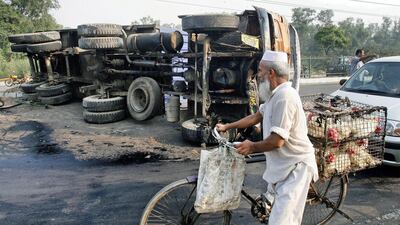The New Delhi government is offering a financial reward to passers-by who take anyone injured in a road accident to hospital. As part of the new "Good Samaritan" ruling, it will also pay for treatment even in private hospitals.
Anyone who takes an injured person to hospital will now receive a 2,000 rupee (Dh114) reward along with a certificate of "good character." The ruling also applies to those who help victims of fire or acid attacks.
The new measure is an attempt to reduce the number of road deaths by taking advantage of what doctors call the "golden hour" — those vital minutes immediately after an injury that can often make the difference between life and death.
"If any citizen is in an accident on the streets of New Delhi, the whole cost of treatment will be borne by the government. The first priority is to save the life of the person', said Health Minister Satyendra Jain.
Around 9,000 accidents a year occur on the roads of the Indian capital. Four people die every day in road accidents. According to a 2015 World Health Organisation report, the country as a whole tops the world league in road crash deaths and injuries.
______________
Read more: Indian state's Good Samaritan law aims to combat road deaths
______________
Passers-by tend not to help road accident victims because they fear getting entangled with the police and suffering harassment. Even those who do stop to help lose precious time because they invariably take the accident victim to a government hospital where treatment is free, rather than the nearest hospital, which may be private.
Even if they go to a private hospital, the patient could be turned away if he or she has no medical insurance. If that happens, it means another journey to a government hospital and more delay in treating the crash victim.
With 10 million registered vehicles on the road — almost a million new vehicles were added last year — and much speeding, reckless and drunk driving, the roads of the Indian capital are very dangerous. Many motorists simply pick up driving without ever taking formal lessons or passing a driving test. A survey by the Save Life Foundation in July found six out of 10 drivers had obtained a licence without ever passing a test.
On top of that, the roads are poorly laid out and maintained and traffic laws are hardly ever enforced.
Piyush Tewari, founder of the Save Life Foundation, has been campaigning for road safety for the past 10 years, ever since his 17-year- old cousin, Shivam, died in a hit-and-run accident. Given the spot in Kanpur, Uttar Pradesh where it happened and the time of day, during evening rush hour, Mr Tewari estimates that hundreds of people must have walked by and left Shivam to bleed to death.
Mr Tewari’s research shows that 88 per cent of those surveyed are reluctant to help accident victims for fear of legal hassles, repeated police questioning and court appearances as an eyewitness. The Law Commission of India estimated in 2006 that 50 per cent of road crash deaths could have been prevented if rapid help had been available. In its own more recent survey, the Save Life Foundation found there had been no improvement.
It was thanks to Mr Tewar's efforts that the "Good Samaritan law" has come about at all. The New Delhi government actually passed a law last January which stated that any person helping an accident victim would not be harassed by the police, by the courts or by hospitals demanding payment. But that law is only now being implemented — with the crucial addition of guaranteed free treatment in any hospital for accident victims.
"‘This new measure could be a game-changer in reducing road deaths and we welcome it,’"said Mr Tewari.
It’s not yet clear how the funding will be arranged between the government and the private hospitals, nor what measures will be put in place to avoid misuse, which Mr Tewari admits is a possibility.
"It could be abused if, say, the Good Samaritan and the hospital are in cahoots but I’m sure they will have checks in place," he said. "The rewards can be paid by cheque and the hospital can be asked for an undertaking, for example, that the victim is not related to the passer-by."

